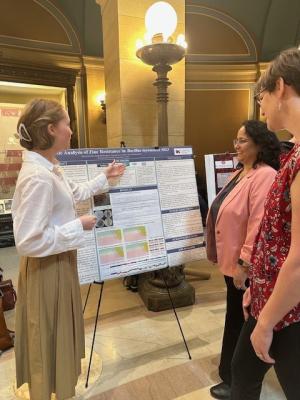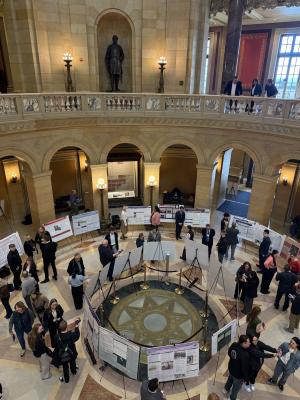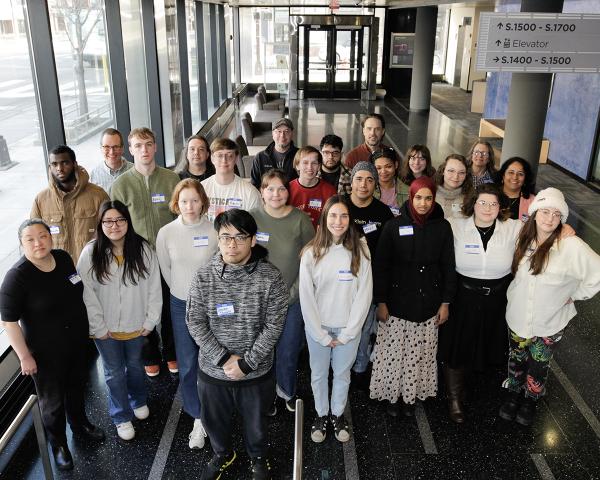School of Science, Mathematics, and Technology
Minneapolis College School of Science, Mathematics, and Technology is known for creating transformative opportunities for students to learn about Biology, Chemistry, Environmental Science, Health Sciences, and Mathematics so students can sharpen their knowledge and skills in the classroom, on the computer, and in the laboratory.
Students who are fascinated by the natural world, love asking questions about how things work, and like making decisions based on observations and analysis, the School of Science, Mathematics, and Technology may be the place to shape a vibrant future.
Building Knowledge
The programs within the school build a student’s knowledge and sharpen their critical thinking skills and analytical ability and prepare them for transfer to a four-year institution. Students have an opportunity to work with state-of-the-art technology in the College’s Science Center and laboratories are customized for each course to ensure a skill mastery.
Innovative curriculum design is tailored to encourage student’s creativity and critical thinking and is taught by knowledgeable instructors, many of whom have in-depth experience working in their fields. Research opportunities are embedded into the coursework so students can enhance academic achievement, career prospects, and bachelor’s and graduate school applications.
Outside of the classroom, students can obtain support through study groups, tutorials, research opportunities, and a variety of extracurricular activities including the Math Club, Urban Farm Collective, Empowering Women in STEM, Cyber Defense Club,and the Computer Club..
Grant Funding Supports Innovative Research on Campus
Minneapolis College is recognized for its innovation resulting in the College being the recipient of grants that support students and faculty. One powerful example is the U.S. National Science Foundation’s (NSF) investment of \$14.5 million in the inaugural set of awards through its Innovation in Two-Year College in STEM Education (ITYC) program. The program supports potentially transformative projects that will advance innovative, evidence-based practices at two-year colleges nationwide in science, technology, engineering, and mathematics education.
Renu Bhagat Kumar, Ph.D., Biology Faculty and PI/Director of NSF S-STEM grant programs at Minneapolis College, was instrumental in securing NSF funding in the amount of \$499,006 to enhance the undergraduate research initiative at the institution and NSF STEM grant amount of \$850,000 to support Collaborative Research: Partnership Pathways to Improve the Professional Preparation of Low-Income Students in Science, Technology, Engineering and Mathematics in Minnesota
“STEM Undergraduate Research Experience Workshop supported by the NSF grant was an exciting opportunity to contribute to our undergraduate research efforts at Minneapolis College,” said Renu Bhagat Kumar. “The workshop conducted by Sara Brownell, Ph.D., President's Professor at Arizona State University included opportunities for faculty to plan and start developing these experiences with her support as well as dialogue with peers.”
“It has been my pleasure to work with such inspiring and motivated individuals as co-facilitator of Minneapolis College's NSF funded STEM programs,” said Wendy Naughton, chemistry faculty at Minneapolis College. “Our local and global communities are strengthened by this funding, which supports a talented group of scholars who are sure to make many valuable contributions in their STEM professions."
Maryia Daniliuk, Student Experience

“My nearly year-long research on genetic mechanisms of zinc resistance in Bacillus toyonenesis has been an incredible experience,” said Maryia Daniliuk, Minneapolis College student. “Trying to locate the zinc resistance gene in Bacillus toyonensis using the Galaxy, Blast, QIAGEN and KBASE Genomic Platforms, I gained hands-on skills in bioinformatics, genome analysis, and data interpretation, which are essential for my future career in biochemistry and medicine. I am especially grateful to my research advisor, Dr. Renu Kumar, for her guidance and for challenging me to think critically about my project.” Daniliuk presented her research at three conferences in Chicago (2024 S-STEM Scholars & PI Meeting), Pittsburgh (2024 Annual Biomedical Research Conference for Minority Students), and Saint Paul (2025 Posters at State Capitol).
“This experience helped me build confidence in sharing research and improved my communication skills. It also taught me patience and flexibility since research does not always go as planned. Being my first research experience, it made me excited to pursue additional research at the University of Minnesota next year.” Daniliuk graduated from Minneapolis College and is continuing her bachelor’s in science at the University of Minnesota.
Robert Fink, NSF STEM Scholar who is transferring to University of Minnesota for Bachelor of Science in Plant Science said, “I will be ever thankful for the support and opportunities Renu and Wendy helped give me. Without the STEM program and scholarship, I would not have been able to attend Minneapolis College. The events and meetings throughout the semester helped me feel out where I would like to specialize and take my major.”
Shaping Your Future

People in science, mathematics, and technology careers apply essential math and science content and skills in real world occupations that include those in the physical, environmental, and human endeavors.
Visit the website for a range of opportunities at Minneapolis College.
